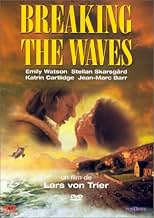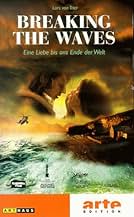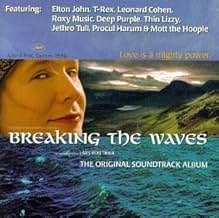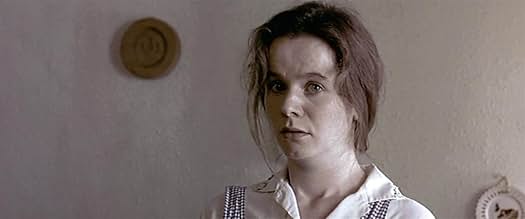AVALIAÇÃO DA IMDb
7,8/10
74 mil
SUA AVALIAÇÃO
Oilman Jan fica paralisado em um acidente. Sua esposa, que orou por seu retorno, se sente culpada; ainda mais, quando Jan a incentiva a fazer sexo com outra pessoa.Oilman Jan fica paralisado em um acidente. Sua esposa, que orou por seu retorno, se sente culpada; ainda mais, quando Jan a incentiva a fazer sexo com outra pessoa.Oilman Jan fica paralisado em um acidente. Sua esposa, que orou por seu retorno, se sente culpada; ainda mais, quando Jan a incentiva a fazer sexo com outra pessoa.
- Direção
- Roteiristas
- Artistas
- Indicado a 1 Oscar
- 45 vitórias e 28 indicações no total
Finlay Welsh
- Coroner
- (as Finley Welsh)
- Direção
- Roteiristas
- Elenco e equipe completos
- Produção, bilheteria e muito mais no IMDbPro
Avaliações em destaque
Lars von Trier's Breaking the Waves is the kind of film that makes me proud to be a film-goer and exceeds anything I could have possibly expected from the man who made Element of Crime. That film had some clever experimentation (and so does this one) but this film is the kind that's beauty and power echoes in your mind hours after you've watched it. This is a flabbergasting work of art that portrays a woman's quest to please God and does so with the complexity and emotional power of a Bergman film (not to mention the fact that the film portrays a woman's intense suffering in world sternly ruled by men with the power of a Dreyer film). If von Trier made nothing else of any merit for the rest of his career, if all he did was make marginally interesting film experiments, I wouldn't hesitate to call him a great filmmaker on the soul basis of this film. Anyway, you get the picture
The film stars Emily Watson as Bess, a shy and neurotic girl who is filled with joy to be with her new husband Jan (Stellan Skarsgard who is exceptional). When Jan is paralyzed after an accident at the oilrig he works in, he is in danger of losing his life. He convinces Bess to see other people and Bess wants nothing more than to make him happy and to prove to God that she loves him. After some disastrous complications, Bess is led to believe that she can please God and save Jan's life by having numerous sexual encounters with strangers in town. This sounds like a grungy tale, but von Trier tells it with such humanism and focus on his themes that we never feel like he is rubbing our faces in drear. And Watson is delightful, frightening, and heartbreaking as a woman who will stop at nothing to please those around her. Her one-sided conversations with God (in which she looks up in the air submissively and pleas and then looks down with a deep voice of wrath and scolds) are both funny and sad, not to mention the fact that they reveal seemingly endless amounts of details about who she is. The film is made with a hand-held camera and a visually stunning solarized style. This style does not make the movie; it just adds richness to each scene in the way it gives each face such shadowy texture. In the end, von Trier seems to believe in God but does not believe in the churches that try to codify what he wants. All of this works because of von Trier's passionate desire to understand how one can please God under horrendous terms; the epilogue, that takes the already-great material to a new level and shows how inspired von Trier is, starts with a moment of sad irony and then leaps to the skies with an image that fills the most atheistic person with questions and the more religiously spiritual people with hope. Here is a film that reaches for the stars and makes it there.
Emotional power is one of the most difficult and complex aspects of film-making to succeed in. Very few films can manage to be emotionally destructive, while still retaining the viewer's concentration and dedication to the piece. Yet, Breaking the Waves is a film that holds more emotionally power that most films, it is not a film you will want to see again. One viewing is enough (at least for a long period of time). Bearing in mind, you will feel devastated by the film's self-destructive nature and after viewing such an unforgettable story of heart ache and sadness you will have etched into the back of your mind.
Breaking the Waves is a complicated story; it is one that studies love, regret, guilt, madness and religion. Breaking the Waves is set in a small religious town deep in Scotland and tells the sorrowful story of the innocent Bess (Emily Watson) and her lover Jan (Stellan Skarsgaard). Jan becomes paralysed in a freak accident at the oil-rig he is working on and asks his estranged wife Bess to have sex with other men and then tell him what it was like to keep their relationship stable.
Lars Von Trier, the founder of Dogme film-making creates a drama that remains in a league of its own. Though Breaking the Waves is not Dogme film-making (like The Idiots) it still has elements of Dogme film-making style littered around it. The film is separated into chapters, which work as wonderful mood and symbolic transitions. These sequences are a single shot focusing on something that is considerably impressive, with the added touch of a brilliantly chosen song to fit the mood. The film's general direction is one that feels like it has been shot with a hand-held style.
The film studies many questionable elements of life, including topics such as death, terminal illness, spirituality, emotions and hypocrisy in religion. These are just a view of the talking points that crop up throughout the long running-time. The film asks the viewer questions and most importantly tests how much harrowing devastation you can handle. There is no denying just how pure Breaking the Waves is.
Emma Watson gives a career defining performance with her pitiful role of a naive young woman, who just wants to be free from pain. The performance is very painful to watch because it is so unbearably realistic. You become apart of her journey and watch her emotions and sanity spiral out of control, even from the people who love her. Heartbreaking in every way.
Breaking the Waves is a difficult film and one that is not for everyone, though I say it is a film which deserves the critical acclaim it gets.
Breaking the Waves is a complicated story; it is one that studies love, regret, guilt, madness and religion. Breaking the Waves is set in a small religious town deep in Scotland and tells the sorrowful story of the innocent Bess (Emily Watson) and her lover Jan (Stellan Skarsgaard). Jan becomes paralysed in a freak accident at the oil-rig he is working on and asks his estranged wife Bess to have sex with other men and then tell him what it was like to keep their relationship stable.
Lars Von Trier, the founder of Dogme film-making creates a drama that remains in a league of its own. Though Breaking the Waves is not Dogme film-making (like The Idiots) it still has elements of Dogme film-making style littered around it. The film is separated into chapters, which work as wonderful mood and symbolic transitions. These sequences are a single shot focusing on something that is considerably impressive, with the added touch of a brilliantly chosen song to fit the mood. The film's general direction is one that feels like it has been shot with a hand-held style.
The film studies many questionable elements of life, including topics such as death, terminal illness, spirituality, emotions and hypocrisy in religion. These are just a view of the talking points that crop up throughout the long running-time. The film asks the viewer questions and most importantly tests how much harrowing devastation you can handle. There is no denying just how pure Breaking the Waves is.
Emma Watson gives a career defining performance with her pitiful role of a naive young woman, who just wants to be free from pain. The performance is very painful to watch because it is so unbearably realistic. You become apart of her journey and watch her emotions and sanity spiral out of control, even from the people who love her. Heartbreaking in every way.
Breaking the Waves is a difficult film and one that is not for everyone, though I say it is a film which deserves the critical acclaim it gets.
It's a pity that for most people Lars von Trier's involvement with the Dogme group of film makers is the main thing they know about him. Wherever you stand on the Dogme issue (personally I'm all for it as long as they continue to make movies as great as 'Festen' and 'The Idiots'), his brief alliance with the group has overshadowed amazing work like 'Element Of Crime', 'Europa' and 'Breaking The Waves'. 'Breaking The Waves' was made before the Dogme manifesto was formulated, but it can be seen as a step in that direction, with its use of documentary techniques as opposed to the flamboyant and highly stylized approach of von Trier's earlier films. To me the ends justifies the means, and the bottom line is that this is an extraordinary and powerful movie, one of the greatest of the last ten years. The main reason it is so remarkable is because of the devastating performance of Emily Watson, one of the most impressive screen debuts in the history of film. Watson plays Bess McNeill, a naive and odd young woman living in a remote and deeply religious Scottish community. She is so good in this movie she'll leave you speechless! Stellan Skarsgard, a most underrated actor in my opinion,('Insomnia', 'Ronin') plays Bess's husband and is also superb, and the supporting cast includes the late Katrin Cartlidge ('Naked') as Watson's sister-in-law, and von Trier regulars Jean-Marc Barr (almost unrecognizable from his leading role in 'Europa'), as one of Skarsgard's work buddies, and cult legend Udo Kier ('Flesh For Frankenstein', 'The Story Of O') in a cameo as a very nasty piece of work who Bess has the misfortune to encounter. The less you know about this movie the more powerful it will be, and even a jaded cynic like myself was surprised at how effective its spiritual theme was. To me 'Breaking The Waves' is a much better more than von Trier's better known 'Dancer In The Dark', and Watson's performance makes Bjork's look like that of an enthusiastic but not very talented amateur (which of course, is exactly what she is). Highly recommended.
Without a doubt, this is one of the most emotionally devastating films I've ever seen in my life. It seems to be a rumination on the true nature of goodness. Bess is a simple creature and her purity and innocence are delivered by Emily Watson in a heartbreaking performance that you will not soon forget. It is a crime that Watson didn't win Best Actress for this role, though I imagine that many voters were turned off by the disturbing subject matter of this film. I had a visceral reaction to the film in the form of serious physical and emotional discomfort. I had rented it, and actually had to stop it at several points and give myself some time to recover before continuing on. I'm not sure it's a film that I'd ever want to see a second time, but I believe it is a true work of art and am grateful to have seen it.
The first time I saw Breaking the Waves, I was astonished that Emily Watson had not acted for the cinema before her turn as Bess McNeill. What she brings to the role of the naive Scottish girl offers a clinic on superlative acting that could humble veterans with ten times the experience. Another thing that makes this film so special is that it never backs away from its vivid and mature examination of love, commitment, and aspects of the metaphysical. I easily class this work as one of the top films of the 1990s. Director Lars von Trier is a true visionary, and the (largely hand-held) cinematography by Robby Muller perfectly defines the tone of the film -- in fact, the theatre where I saw Breaking the Waves posted a disclaimer that warned anyone who suffers from motion or sea-sickness to see the film at their own peril!
Você sabia?
- CuriosidadesTheatrical film debut of Emily Watson. She received an Oscar nomination and was expelled from the School of Economic Science (the alleged cult she was brought up in) for her role in this film.
- Erros de gravaçãoThe film is set in the early 1970s, but the van featured prominently in the car park and heliport scenes is a mid-1980s Freight Rover 200, formerly known as the Leyland Sherpa.
- Citações
Dodo McNeill: Not one of you has the right to consign Bess to hell!
- Versões alternativasThe director's cut of the film, featuring explicit shots removed from the U.S. version for ratings purposes, is available on Criterion laserdisc.
Principais escolhas
Faça login para avaliar e ver a lista de recomendações personalizadas
Detalhes
- Data de lançamento
- Países de origem
- Idioma
- Também conhecido como
- Rompiendo las olas
- Locações de filme
- Empresas de produção
- Consulte mais créditos da empresa na IMDbPro
Bilheteria
- Orçamento
- DKK 42.000.000 (estimativa)
- Faturamento bruto nos EUA e Canadá
- US$ 3.803.298
- Faturamento bruto mundial
- US$ 3.831.182
- Tempo de duração2 horas 33 minutos
- Cor
- Mixagem de som
- Proporção
- 2.35 : 1
Contribua para esta página
Sugerir uma alteração ou adicionar conteúdo ausente

Principal brecha
What was the official certification given to Ondas do Destino (1996) in Japan?
Responda




























